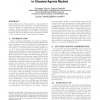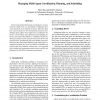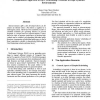37 search results - page 1 / 8 » Rational Coordination in Multi-Agent Environments |
AAMAS
2000
Springer
13 years 4 months ago
2000
Springer
We adopt the decision-theoretic principle of expected utility maximization as a paradigm for designing autonomous rational agents, and present a framework that uses this paradigm t...
ATAL
2005
Springer
13 years 10 months ago
2005
Springer
Situated Multi Agent System models are characterized by the representation and exploitation of spatial information related to agents, the environment they inhabit and their positi...
HICSS
2003
IEEE
13 years 9 months ago
2003
IEEE
We adopt the decision-theoretic principle of expected utility maximization as a paradigm for designing autonomous rational agents operating in multi-agent environments. We use the...
ATAL
2004
Springer
13 years 8 months ago
2004
Springer
Most research about multi-agent coordination is concentrated at a high level, e.g., developing coordination interaction protocols to be imposed on agents. There has been less conc...
HICSS
2003
IEEE
13 years 9 months ago
2003
IEEE
Microeconomics offer a far developed theory on the subject of rational choice. This theory is applied to a multi-agent system, which has been modeled in order to establish schedul...



